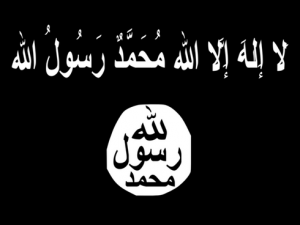ISISU.S. captures head of ISIS chem weapons unit; targets ISIS chem weapons infrastructure
U.S. Special Forces operating in Iraq captured the head ISIS chemical weapons unit. Sleiman Daud al-Afari, who worked for Saddam Hussenin’s now-disbanded Military Industrialization Authority where he specialized in chemical and biological weapons, was captured during a raid near the northern Iraqi town of Tal Afar last month.American and Iraqi officials say that there are many indications that ISIS is working hard to develop chemical weapons.

Flag of the Islamic State in the Levant // Source: commons.wikimedia.org
U.S. Special Forces operating in Iraq captured the head ISIS chemical weapons unit. Sleiman Daud al-Afari, who worked for Saddam Hussenin’s now-disbanded Military Industrialization Authority where he specialized in chemical and biological weapons, was captured during a raid near the northern Iraqi town of Tal Afar last month.
The Daily Beast reports that U.S. officials last week said that an important ISIS military leader had been captured, but did not offer any details except to say he was being interrogated.
Two Iraqi officials, who spoke to AP on a condition of anonymity, said Afari is about 50 years old and heads ISIS’s recently established branch for the research and development of chemical weapons.
The New York Times reports that Afari is being held under American control at a detention facility in Erbil, Iraq. He told U.S. officials that ISIS had weaponized mustard gas into powdered form and loaded it into artillery shells.
U.S. defense officials who studied Afari’s statements said it appears that the mustard gas was not concentrated enough to kill anyone, but it could maim people.
The Pentagon said that when Afari’s interrogation is over, he will be handed over to the Iraqi and Kurdish authorities.
The capture of Afari, and the killing on 4 March of Abu Omar al-Shishani (“Senior ISIS leader Abu Omar al-Shishani killed in U.S. strike,” HSNW, 9 March 2016), are examples of a more aggressive U.S. approach to the war against ISIS (see “Ash Carter unveils a broader, more robust campaign to defeat ISIS,” HSNW, 14 January 2016).
Iraqi officials and a Western security official in Baghdad told the Times that the U.S.-led coalition began targeting ISIS’s chemical weapons infrastructure with airstrikes and special operations raids over the past two months.
The airstrikes have destroyed laboratories and equipment. Intelligence sources say that more raids by Special Forces, aiming to capture or kill ISIS chemical weapons experts, will be carried out.
American and Iraqi officials say that there are many indications that ISIS is working hard to develop chemical weapons. Analysts say that the Islamist group has set up a special unit for chemical weapons research. The unit is manned by Iraqi scientists from the Saddam-era weapons program, but also employs foreign experts.
In February, U.S. intelligence officials confirmed that ISIS managed to produce and deploy chemical agents.
Director of National Intelligence, James Clapper, told lawmakers that “sulphur mustard” had been used in an alleged ISIS attack in Syria and there are “numerous allegations” of ISIS’s use of chemical weapons in both Syria and Iraq, mostly in attacks on Kurdish forces.
